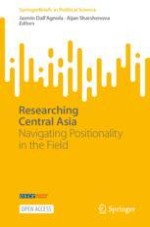Open Access 2024 | Open Access | Book

Researching Central Asia
Navigating Positionality in the Field
Editors: Jasmin Dall'Agnola, Aijan Sharshenova
Publisher: Springer Nature Switzerland
Book Series : SpringerBriefs in Political Science
Open Access 2024 | Open Access | Book

Editors: Jasmin Dall'Agnola, Aijan Sharshenova
Publisher: Springer Nature Switzerland
Book Series : SpringerBriefs in Political Science
This open access book explores some of the struggles and challenges that researchers and practitioners face when conducting research in the Central Asian research setting. Written for scholars still in the planning stages of their research, it addresses key questions, including: How shall we problematize and reconceptualize the concept of positionality through lenses of local voices from the region? How does practitioners’ and scholars’ positionality contribute to their experiences of inclusion, exclusion, and access to the field? How do scholars navigate issues of personal safety and mental well-being in the more closely monitored societies of Central Asia?
The book includes contributors from both Central Asia and Western countries, paying particular attention to the ways researchers’ subjectivity shape how they are received in the region, which, in turn, influences how they write about and disseminate their research. In featuring an even greater variety of voices, this book fills an important gap in the literature on field research and knowledge production in and on Central Asia.